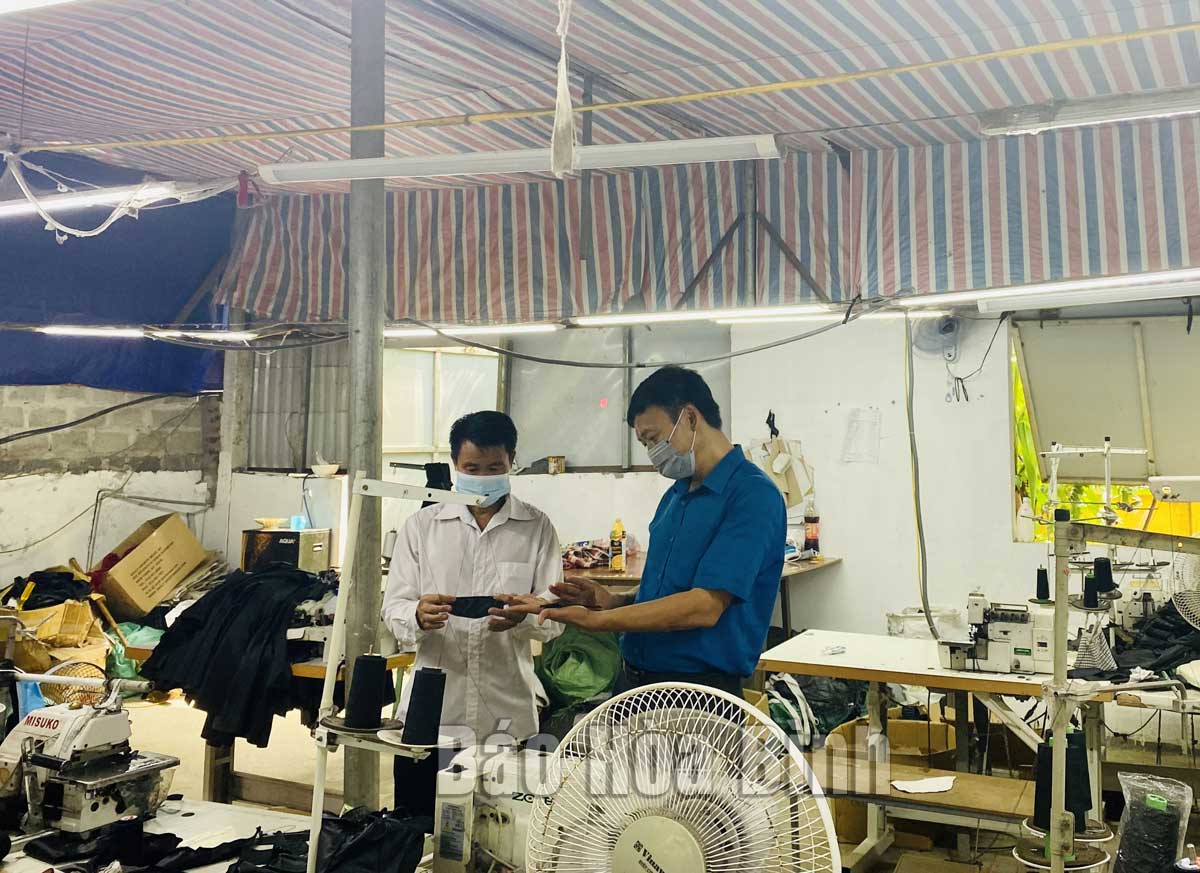(HBO) - In difficult conditions due to the impact of Covid-19 epidemics, collective economic organizations have made great efforts to overcome difficulties. They have mobilized all resources to withstand and reduce damage, to maintain and develop production and business. In 2021, the total profit of collective economic organizations reached 132.37 billion VND, accounting for 0.24% of the total added value and equaling to 0.43% of the province's GRDP. The total payment to the State budget was estimated at 5,083 billion VND, accounting for 0.1% of the total revenue of the state budget of the province.
The leaders of the Provincial Cooperative Union have grasped the activities of cooperatives to promptly help them overcome the difficulties of Covid-19 pandemics. The photo taken at Huy Chi general service cooperative in Hung Son commune (Kim Boi).
According to the report of the Provincial Steering Committee for developing the collective economy, by December 31st, 2021, in the whole province there are 454 cooperatives, increasing 7.5% compared to that in 2020, the average revenue was 2.23 billion VND /cooperative, the average profit was 250 million VND/cooperative, the average income of the regular worker in the cooperative was 4.26 million VND/person/month; 4 People's Credit Funds, the difference between the income and the expenses of people's credit funds reached 5.73 billion VND and 211 cooperative groups, increasing 6.5% compared to that in 2020, the average revenue reached 220.14 million VND/coorperative group, the average profit was 56.5 million VND/coorperative. During the year, 67 new cooperatives and 18 cooperative groups were established in the whole province. The organizations of the collective economy attracted 15.2 thousand members and 26,000 employees.
Mr. Dinh Cong Su, the Vice Chairman of the Provincial People's Committee, the Head of the Provincial Council for Developing Collective Economy, emphasized: In 2021, the operating content and mode of the cooperative continued to be renewed, diversifying in industries and the organizational size of production and business. The model of linking cooperatives with enterprises and the member households in production and consumption of products has been developing in many places. Technology and equipment have been paid attention to be innovated, and many cooperatives have paid attention to the market research, the organization of production and consumption of products according to the value chain and the participation in the OCOP Program. Thereby, the productivity and the product quality have improved, affirming the brand and the reputation in the market. Despite facing many difficulties due to the epidemics, the cooperative groups, the cooperatives and the people's credit unions have made great efforts to rise up and mobilize all resources to withstand, maintain and develop production.
In 2021, the Central Committee for Developing Collective Economy has actively advised the Provincial Party Committee and the Provincial People's Committee to lead and direct the development of the collective economy and cooperatives. In which, the Provincial Cooperative Union has promoted the core role in the development of the collective economy and cooperatives. Mr. Tran An Dinh, the Chairman of the Provincial Cooperative Union said: Right from the beginning of 2021, the Provincial Cooperative Union has actively advised and proposed the mechanisms, the policies and the solutions to develop the collective economy and cooperatives. They actively synchronously implemented the guidelines of the Party, the policies and the laws of the State on the collective economy. They also proactively developed plans to adapt to the epidemics. They were flexible in the propragnda forms, organizing the direct dialogues on the policies to help cooperatives overcome difficulties, making efforts to implement the digital transformation for the organizations of collective economy... The important highlight was the trade promotion activities, expanding the markets for the product consumption in the context of Covid-19 epidemics. The Provincial Cooperative Union organized one conference to connect supply and demand, 10 specialized conferences, 10 field meetings to promote trade and connect supply and demand, linking and selling products with more than 150 cooperatives with the participation of more than 90 enterprises. They guided the the cooperatives to sell on e-commerce platforms such as Sendo, Voso, Postmart... Thereby, more than 1,000 tons of products of all kinds were consumed, initially forming the chains of the production linkage associated with consuming the medicinal products, oranges, safe vegetables, grapefruits, bananas, chicken...
In addition, to support the cooperatives with the capital maintaining production through the pandemics, the Provincial Cooperative Union loaned 3.27 billion VND from the Cooperative Development Support Fund to 13 cooperatives; over 1.4 billion VND from the National Job Creation Fund was given to 20 members of 12 cooperatives.
Besides the achieved results, most of the cooperatives and coopẻatiev groups have the micro-scale operations with little capital, and they lack of business plans and market information and dynamism. The output, the quality, the design and the cost of goods and services have not yet created a competitive advantage in the market. The management and administration are still weak, and some of the cooperatives lack capital and they find it difficult to access the loans. There are also cooperatives that operate in a formal, inefficient or improper manner, and the benefits the cooperative brings to its members is not high. In 2022, they are trying to establish 10 new cooperative groups and 40 cooperatives, strengthen 30 cooperatives. They will dissolute 100% of the cooperatives operating in contravention of the Law on Cooperatives. The average revenue of a cooperative will increase from 6-8% a year, the income of the cooperative workers will increase by 4% on average. They will increase by 3% the number of the individual households participating in the membership of the organizations of the cooperative groups…



